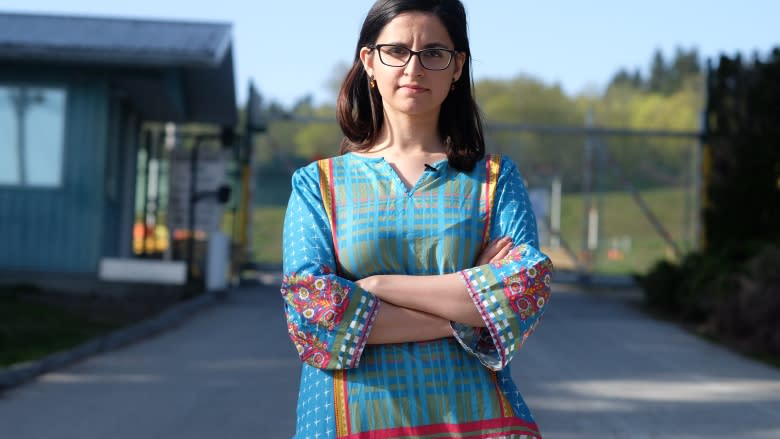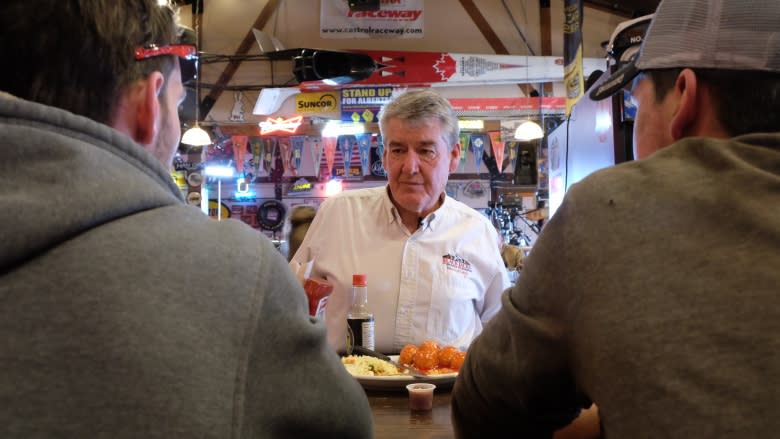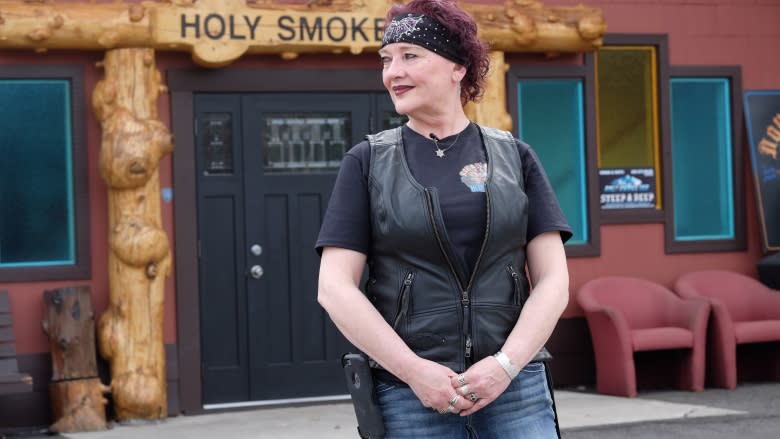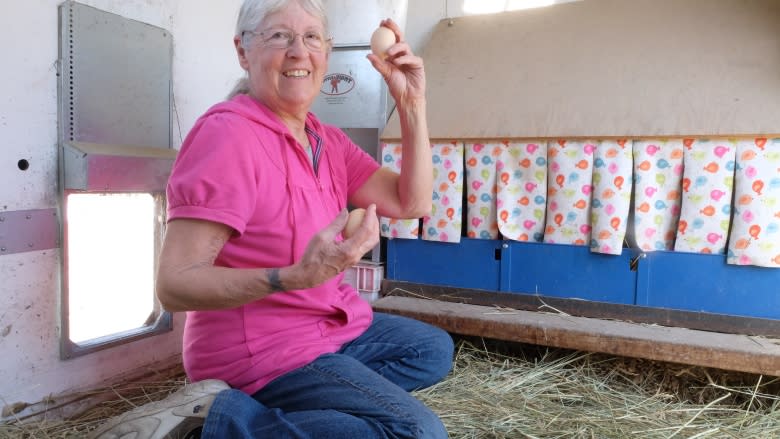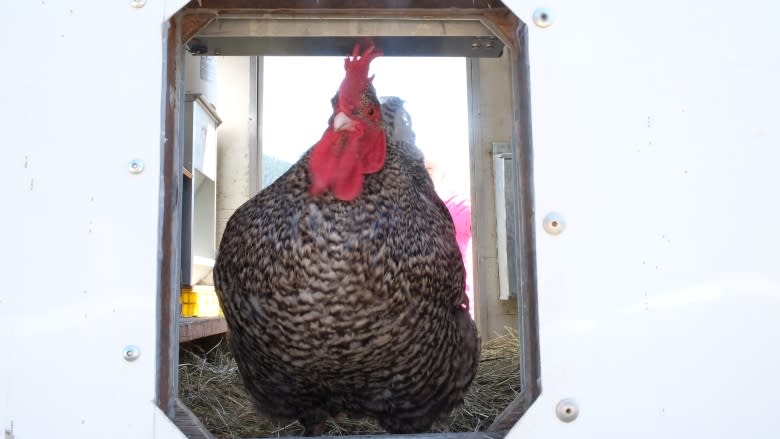Trans Mountain: Meet the people who live along Canada's most controversial pipeline
There's probably nothing more controversial in Canada right now than Kinder Morgan's plan to expand its 1,000-kilometre Trans Mountain pipeline.
The idea is to triple the amount of bitumen the pipe can carry from Alberta's oilsands to the B.C. coast. The project has the support of the federal government, which believes the pipeline is critical to the future of the country.
Environmentalists, on the other hand, worry it is an ecological disaster waiting to happen.
The National sent reporter Nick Purdon and producer/videographer Leonardo Palleja to drive the pipeline route from Edmonton to Vancouver and talk to the people who live along it to find out what's at stake for them and their communities.
- WATCH: Nick Purdon's feature from The National on the people living along the Trans Mountain pipeline route
Clarence Shields - Nisku, Alta.
Clarence Shields' natural habitat is behind the giant wooden bar at Blackjack's roadhouse — a kind of unofficial union hall for oilpatch workers.
The bar is a stone's throw from the beginning of the Trans Mountain pipeline. Shields owns the place.
Shields' view is that oil powers the country, and all Canadians benefit from getting it out of the ground.
"In order to keep us whole we built a railway. In order to keep us whole we built pipelines," he says.
"This is really the economic future of the next generation. If we don't have access to our resources, we're going to be a have-not country.
"That's what scares me."
Todd Noble - Jasper, Alta.
Todd Noble, 46, has worked at the Jasper Skytram (the highest and longest in Canada) for 22 years — today he's the general manager.
Even though Noble has made the seven-minute journey and stepped out on the lookout located 2,277 metres above sea level more times than he can count, he says the beauty of Jasper National Park still astonishes him.
He's also keenly aware that Kinder Morgan's Trans Mountain pipeline runs right through the postcard of the country.
In 2008 when Kinder Morgan upgraded its existing pipeline in Jasper to increase its capacity from 260,000 barrels per day to 300,000 bpd, the company impressed Noble.
"They were in and out of here quite smoothly, no issues," he says. "The impact on the area was minimal. Face value, it can seem a little disturbing, but having experienced it before and how they managed the area, it's not such a scary thing to think about."
There have been several spills in Jasper National Park, including one of the biggest in the history of the pipeline when in 1966 almost 7,000 barrels of oil leaked into the park.
Since 1961 there have been 82 spills along the entire length of Kinder Morgan's Trans Mountain route.
Patti Tyacke - Blue River, B.C.
"It used to be a church," laughs Patti Tyacke as she explains why she and her partner Robin named their bed-and-breakfast the Holy Smoke Inn.
Tyacke caters mostly to snowmobilers who explore the area around Blue River, a small town of about 250 people.
"I love this place. It's the jewel of the Yellowhead highway," Tyacke says. "Blue River — it doesn't get any better."
Still, Tyacke — who has lived in Blue River for 24 years — explains how her town has fallen on hard times since the local logging industry dried up.
She's not worried about the environmental risks of expanding the Trans Mountain pipeline. She's worried about Blue River's future.
"This whole valley needs it, we really need it bad," she says of Trans Mountain. "The jobs, and just the people, we need the pipeline to go through in order to survive."
Charles Hays and Penny Powers - Black Pines, B.C.
"That's the rooster. His name is Lucky," says Penny Powers, who has her joke ready whenever anyone visits her small farm just north of Kamloops.
"He's lucky because we had a bunch of males and he was the best one, and the rest went to freezer camp."
Powers, a retired nursing professor, and her partner Charles Hays live close to the land on a farm where they get much of their power from one of the largest sun-tracking solar panels in the province.
If the pipeline expansion gets built, they say it would mean the end of their farm as they know it.
"I don't really like the idea of someone coming in and vandalizing my property and leaving it for me to clean up," says Hays.
He has followed the debate about the pipeline expansion, but finds it lacking. Hays says he wishes the Trans Mountain project, which crosses the property of 2,200 landowners in Alberta and B.C., was more of a referendum on oil.
"The problem is bigger than the farm. The problem is that oil is a 19th century technology," he says.
"We are not having a discussion about what's next, what can we do instead ... it's just, 'we have to pump oil because we have been doing it now for 100 years and we don't know anything else.'"
Pete Ryan - Hope, B.C.
Covered in sawdust, Pete Ryan, the legendary chainsaw carver from Hope, B.C., works on an owl.
"Got to have an owl ready, because there are a lot of smart guys out there," he says. "You have to have smart answers."
For Ryan, the smart answer when it comes to the Trans Mountain pipeline expansion is to quit debating the project and get building.
"It has to get built. It's not a matter of ain't getting built," he says. "If it doesn't get built, we are all in trouble. It's good for the economy and it should be done."
The existing pipeline runs just behind Ryan's property where he has been carving with his chainsaws for 40 years.
"It's not sawdust ... it's man-glitter," Peter Ryan says as he uses a mini-vacuum to blow his t-shirt clean.
Ernie Crey - Cheam First Nation
"Wrong!" Ernie Crey says, doing his best Donald Trump imitation.
Crey is Chief of Cheam First Nation, about 100 kilometres east of Vancouver on the shores of the Fraser River.
"The popular image of Indigenous people is that we are not interested in participating in the economic development of the larger community," he says. "Wrong! We want this pipeline to go through so we can improve our economic standing in Canada."
Crey says he won't allow environmentalists who oppose the project to stand in his way.
"I don't know where they get off thinking that my community can continue to live in poverty in this country by opposing developments that we see as important," he says.
Crey believes in the Trans Mountain pipeline project so firmly that he says his community would consider investing in it to make sure it gets built.
Atiya Jaffar - Vancouver, B.C.
On March 20, Atiya Jaffar sat down with her back against the gate to Kinder Morgan's Burnaby Terminal and broke the law.
"I felt nervous, of course," says the 26-year-old from Vancouver. "I hadn't done anything like this before."
Jaffar and five others were arrested for defying a B.C. Supreme Court injunction which states that demonstrators must stay at least five metres back from all Kinder Morgan facilities.
"I want to be able to look my children in the eye years from now and tell them that I did what I could to protect their future," Jaffar says.
"It's so important in moments like this to stand on the right side of history when politicians like Justin Trudeau are not doing so."
Ronnie Dean Harris - Vancouver, B.C.
In the final pipeline right-of-way, a dozen or so metres from Kinder Morgan's Burnaby operation, Ronnie Dean Harris clears his throat and starts to rap.
"You're all making deals with the devil without checking the levels ..." the Stō:lo/St'át'imc/Nlaka'pamux artist rhymes.
Harris is a fixture in and around the permanent protest camp set up outside Kinder Morgan's Burnaby Mountain operation.
Even so, he admits he's nervous about standing up against the pipeline.
"Speaking up against this industry, against this project, puts me in danger — puts my family in danger," he says.
"We are living in a country where we know the justice system doesn't serve us well."
More from CBC
Watch Nick Purdon's feature from The National on the people living along the Trans Mountain pipeline route:

